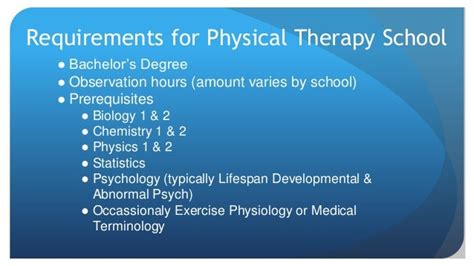Pt Schools Prerequisites

Physical therapy (PT) schools are institutions that offer educational programs in physical therapy, leading to a Doctor of Physical Therapy (DPT) degree. To be eligible for admission to a PT program, applicants must meet specific prerequisites, which may vary depending on the institution and its accreditation status. In the United States, the Commission on Accreditation in Physical Therapy Education (CAPTE) is the sole accrediting agency for physical therapy programs, ensuring that these programs meet the required standards for education and training.
Standard Prerequisites for PT Schools

While specific prerequisites may differ among institutions, there are common requirements that applicants must fulfill to be considered for admission to a PT program. These typically include:
- Bachelor’s Degree: Most PT programs require applicants to have earned a bachelor’s degree from an accredited institution. The degree can be in any field, but courses in sciences and mathematics are highly recommended.
- Prerequisite Courses: Applicants must complete a set of prerequisite courses, which usually include biology, chemistry, physics, anatomy, physiology, biomechanics, and statistics. The specific courses and their intensity may vary among programs.
- Grade Point Average (GPA): A minimum cumulative GPA, often 3.0 or higher, is required. Some programs may also require a minimum GPA in the science prerequisite courses.
- Observation Hours: Many programs require applicants to have completed a certain number of observation hours in physical therapy settings. This requirement helps applicants understand the profession and demonstrates their commitment to the field.
- GRE Scores: Some PT programs require applicants to submit Graduate Record Examination (GRE) scores. The requirement for GRE scores can vary, and some programs may not require them at all.
- Letters of Recommendation: Applicants are usually required to submit letters of recommendation from professionals who can speak to their academic and personal qualities, often including at least one from a physical therapist.
Additional Requirements and Considerations
Beyond the standard prerequisites, some PT programs may have additional requirements or recommendations. These can include:
- Volunteer or Work Experience: Some experience in healthcare, particularly in physical therapy, can be beneficial and may be required by some programs.
- Personal Statement or Essay: Applicants are often required to submit a personal statement or essay as part of their application, outlining their motivation for pursuing a career in physical therapy and their understanding of the profession.
- Interviews: Many programs invite selected applicants for interviews as part of the admissions process. These interviews can be in-person, over the phone, or via video conferencing.
| Prerequisite | Typical Requirement |
|---|---|
| Bachelor's Degree | Any field, with recommended courses in sciences and mathematics |
| Prerequisite Courses | Biology, chemistry, physics, anatomy, physiology, etc. |
| GPA | Minimum 3.0 cumulative and in science prerequisite courses |
| Observation Hours | Varying number of hours, often 100 hours or more |
| GRE Scores | Required by some programs, with varying minimum scores |

Key Points
- Meeting the prerequisites is essential but does not guarantee admission to a PT program.
- Researching the specific requirements for each program of interest is crucial.
- A strong application, including a high GPA and significant observation hours, can enhance an applicant's chances.
- Personal statements and interviews are opportunities for applicants to demonstrate their understanding of and commitment to the physical therapy profession.
- Volunteer or work experience in healthcare can be beneficial for applicants.
In conclusion, the prerequisites for PT schools are designed to ensure that applicants are well-prepared for the rigors of a physical therapy program and have a solid foundation in the sciences. By understanding and meeting these prerequisites, applicants can position themselves for success in their applications and eventual careers as physical therapists.
What are the typical prerequisite courses for PT programs?
+The typical prerequisite courses include biology, chemistry, physics, anatomy, physiology, biomechanics, and statistics. However, the specific courses required can vary among programs.
Do all PT programs require GRE scores?
+No, not all PT programs require GRE scores. The requirement for GRE scores can vary, and some programs may not require them at all. It’s essential to check the specific requirements for each program.
How important is observation experience in physical therapy settings?
+Observation experience in physical therapy settings is highly valued as it demonstrates an applicant’s understanding of the profession and their commitment to pursuing a career in physical therapy. The number of required hours can vary among programs.



